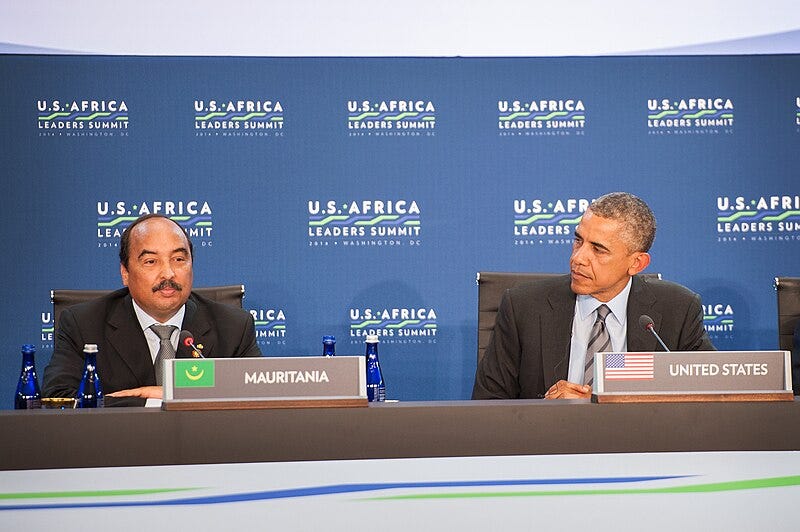🔅 Your Favourite Chocolate, Child Labor, and Unfair Wages
Plus: DRC Says "Non" to EU's Election Observation Mission, How Mauritania's Corruption Caught Up with Him
Photo of the day
Maputo, Mozambique

Money Matters
🟢 Nigerian SE: 71,250.17 (+0.43%)
🔴 Johannesburg SE: 75,215.49 (-0.96%)
🔴 Ghana SE: 3,149.13 (-0.01%)
🟢 Nairobi SE: 94.70 (+1.15%)
🔴 US S&P 500: 4,563.27 (-0.14%)
🔴 Shanghai Composite: 2,972.30 (-1.67%)
*Data accurate as of the close of markets across the continent
Brief & Bright: Africa's Top Five
Your Favourite Chocolate, Child Labor, and Unfair Wages
The holidays are upon us, and that means one thing: chocolate. But before you indulge in your favourite treats, take a moment to consider the not-so-sweet reality behind many popular brands. According to a recent report, most chocolate companies have "inadequate" ethical standards in their cocoa supply chain, with only 17 out of 82 brands paying farmers enough to live on. That means there's a high chance your Christmas chocolate was made with child labour. Still, there are some brands out there doing the right thing. Tony's Chocolonely, Divine, and Chocolat Madagascar are all recommended for paying fair wages and using chocolate made in the country of origin. On the other hand, Mars, Nestlé, and Cadbury's owner Mondelēz are rated "brands to avoid" — so avoid them this season. As consumers, your choices have power.
DRC Says "Non" to EU's Election Observation Mission
The DRC is gearing up for presidential and parliamentary elections on December 20, and the EU was planning on sending observers to ensure everything went smoothly. But, in a classic case of miscommunication, the DRC refused to authorize satellite equipment for the mission, fearing it could be used to manipulate the results. The EU cancelled their mission in response, citing "technical issues." But sources say it all boiled down to the DRC's fear of foreign influence and meddling in their election. One candidate in particular, Moise Katumbi, has been accused by critics of being backed by Rwanda. The government also has a sneaking suspicion that European states are supporting him too. In general, the election campaign has been marked by accusations that candidates are being propped up by outside forces. The Democratic Republic of Congo's decision to reject the EU's election observation mission is reflective of its long-standing apprehensions about foreign intervention, a sentiment rooted in its colonial past and subsequent geopolitical struggles over its vast natural resources. This incident underscores the DRC's ongoing struggle to balance the need for international support and oversight with fierce protection of its sovereignty, particularly in the context of its complex electoral processes.
From President to Prisoner: How Mauritania's Corruption Caught Up with Him
Mauritania's former president, Mohamed Ould Abdel Aziz, has been sentenced to five years in prison for using his power to make a pretty penny. Aziz's chosen successor, President Mohamed Ould Ghazouani, turned on him and launched an investigation into his alleged financial misconduct. These include allegations of embezzlement, influence-peddling, and money laundering with a focus on the country's oil revenues during his presidency. The former president, who denies all charges, has been accused of amassing $72 million during his time in office. He claims he's the victim of a plot by his rivals, but the court didn't buy it and ordered the confiscation of his ill-gotten assets. The former president, who once led a bloodless coup, is now facing prison time and has even implicated his successor in the corruption scandal, saying he was given millions of euros in two suitcases just after being elected. Mauritania's political history, marked by military coups and authoritarian rule since its independence from France in 1960, provides a backdrop to the dramatic fall of former President Aziz. His rise to power through a bloodless coup in 2008 and subsequent election victories were emblematic of the country's turbulent governance. The sentencing of Aziz not only underscores a potential shift towards accountability in a nation long plagued by allegations of corruption and human rights abuses but also reflects the complex interplay of power, politics, and resource management in Mauritania's recent history.
Guinea-Bissau's Presidential Power Play: Parliament Dissolved
Another day, another dissolution of parliament in Guinea-Bissau. President Umaro Sissoco Embalo issued a decree dissolving the opposition-controlled parliament, citing last week's shootout between his troops and those controlled by the parliament as a failed coup. But the parliament is not going down without a fight, claiming that the constitution states it cannot be dissolved within the first 12 months after an election. This isn't the first time Embalo has pulled this move—he dissolved parliament in 2022 as well, citing "unresolvable differences." Guinea-Bissau's system is a semi-presidential one that doesn't look like it's working out too well. The country has dealt with political turmoil since gaining independence from Portugal in 1974, with four coups and over a dozen attempted coups. The ongoing power struggle between the presidency and parliament highlights the fragile nature of the country's democratic institutions and raises questions about the viability of its current governance model.
Nigerian Army Drone Strike Accidentally Kills 85 Civilians
In one of the deadliest military blunders, an army drone strike killed 85 civilians in a village in Kaduna State. The president has ordered an investigation, but locals are already saying that many of the victims were women and children. Emergency officials are on the scene, trying to calm tensions and reach the village. Nigerian armed forces tend to use airstrikes in their fight against bandit militias and jihadists, but this time it didn’t go according to plan. This tragic incident in Kaduna State is a stark reminder of the complexities and dangers inherent in Nigeria's ongoing struggle against insurgent groups and bandit militias. It highlights the challenges faced by the Nigerian military in distinguishing between combatants and civilians, especially in regions where conflict is deeply intertwined with the daily lives of local communities.
Food for Thought
“One who has to yet learn to walk cannot climb a ladder."
— Ethiopian Proverb







